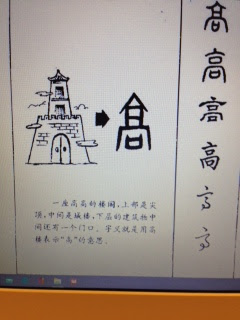September 27, 2020 - Washington D.C. Taiwanese School, Advanced Mandarin Conversation
· We discussed the following issues:
- Teacher Wu asked, "Steve (葛艾倫), Oh, it's Yom Kippur today? do you celebrate?" (吳老師問:“Steve,哦,今天是Yom Kippur?你慶祝嗎? - Wú lǎoshī wèn:“Steve? ó, jīntiān shì shúzuì rì? Nǐ qìngzhù ma?”)
- Steve (葛艾倫) said, "From tonight's sundown to tomorrow's sundown is Yom Kippur. I am a jewish, we gather with family, but I do not fast, not to eat for one day, like my brother does." Steve (葛艾倫)說:“今晚日落到明天日落是Yom-Kippur. 我是猶太人,我們與家人聚會,但我不像哥哥那樣,一天不吃東西 (禁食.) ” Steve (葛艾倫) shuō:“Jīn wǎn rìluò dào míngtiān rìluò shì Yom Kippur. Wǒ shì yóutàirén, wǒmen yǔ jiārén jùhuì, dàn wǒ bù xiàng gēgē nàyàng Yītiān bù chī dōngxī (jìn shí.)"
- The teacher said, "We are so happy that Joseph finally has Chinese name from his wife's help."吳老師說:"我們很高興知道, Joseph(高靖和) 終於在太太的幫助下有了他的中文名字." Wú Lǎoshī shuō: “Wǒmen hěn gāoxìng Zhīdàoī, Joseph (Gāo jìng hé ) zhōngyú zài Tàitài de bāngzhù xià yǒule tā de zhōngwén míngzì."
- 高 - Gāo - Tall, Lofty - The fort, or castle with the top spires, middle tower with guarded windows and bottom base with large door.靖 jìng - Peaceful, firm - The man stands up with two feet on the ground firmly next to the green color plants freshly born in the blue sky.
- Steve (葛艾倫) said, "Is this (Shēng) musical instrument that we are talking about?" Steve (葛艾倫) 說:“我們是在說這個樂器嗎?(笙)” Steve (葛艾倫) shuō:“Wǒmen shì zài shuō zhège yuèqì ma? (Shēng?)”
Sheng (instrument) - Wikipedia - Shēng
(笙)- Teacher Wu said, "No. I know a very famous song that was played from this South American musical instrument (Pan-Flute." 吳老師說:“不,我知道有一首非常有名的歌, 是由南美洲樂器 (排簫) 演奏的。” Wú lǎoshī shuō: “Bù, wǒ zhīdào yǒuyī shǒu hěn yǒumíng de gē, yóu nánměi zhōu yuèqì -paixiao - yǎnzòu de."
Paixiao - Wikipedia (
The paixiao - 排簫)- El Cóndor Pasa (song) - Wikipedia
- Teacher Wu asks, "Joseph(高靖和) Please say "thanks" for your wife that she gave you a very nice Chinese name. This is your homework to ask her why she chose this name!" 吳老師說:“Joseph(高靖和), 請謝謝您的太太,她給您起了一個很好的中文名字。這是您的功課,問她為什麼, 為您選這個名字?””Wú lǎoshī shuō:“Joseph (高靖和) (Qǐng xièxiè nín de Tàitài, tā gěi nín qǐle yīgè hěn hǎo de zhōngwén míngzì. Zhè shì nín de gōngkè, wèn tā wèishéme wèi nín xuǎn zhège míngzì?”.)
- Steve (葛艾倫) asked, "Is Jìng hé related the sound of "Joseph?"" Steve (葛艾倫) 問:“靖和與 Joseph 聲音有關嗎?” Steve (葛艾倫) wèn:“Jìng hé yǔ Joseph shēngyīn yǒuguān ma?”
- Joseph(高靖和) said, "No relationship. My wife said, my name, three characters, has something related with the numbers of the strokes.") (Joseph(高靖和) 說:“沒有關係。 我的太太說, 我的名字, 三個字和筆畫有關.” Joseph(高靖和) shuō,“Méiyǒuguānxì. Wǒ de tàitài shuō wǒ de míngzì sān gè zì hé bǐ huà yǒu guān."
- Raymond (書宗) asked: "Why 靖 ( jīng) has a man standing up?" Raymond (書宗) 問:“為什麼 靖 ( jīng) 會有一個人站起來?” Léi méng dé wèn:“Wèishéme 靖 ( jīng) huì yǒu yīgè rén zhàn qǐlái?”
- Teacher Wu said, "The man stands up with two feet firmly to protect the world. It's a peaceful meaning" 吳老師說:“這個人用兩隻腳站起來保護世界。這是和平的意思。 Wú lǎoshī shuō:“Zhège rén yòng liǎng zhī jiǎo zhàn qǐlái bǎohù shìjiè. Zhè shì hépíng de yìsi."
- Teacher Wu said, "There are 31 strokes on 高 - Gāo 靖 jìng 和 hé - 高 - Gāo has 10 strokes, 靖 jìng has 13 strokes, 和 hé has 8 strokes." 吳老師說:“高 靖 和 有31筆劃 - 高 有 10 筆劃, 靖 有 13 筆劃, 和 有 8 筆劃。 Wú lǎoshī shuō:“高 - Gāo 靖 jìng 和 hé yǒu 31 bǐhuà. - 高 - Gāo yǒu 10 bǐhuà. 靖 jìng yǒu 13 bǐhuà, 和 hé yǒu 8 bǐhuà."
We discussed Lesson 61 (Travelling Around the Island,) 第61課 (環島旅行)-dì 61 kè (Huándǎo lǚxíng)
We are going to visit Sun-Moon Lake - 我們要去日月潭玩 - Wǒmen yào qù rìyuètán wán
- Steve (葛艾倫) said, "I went to the temple at Sun-Moon Lake to Bai-Bai (worship to ask for good-fortune)" Steve (葛艾倫) 說:“我去了日月潭廟裡-拜拜 (祈福)”” Steve (葛艾倫) shuō: "Wǒ qù rìyuètán miào Lǐ bàibài (qiú hǎoyùn)."
Jiaobei - Wikipedia
-
"Jiaobei (Chinese) or bobui (Taiwanese) - two crescent-shaped wood blocks" thrown on the floor asking the fortunes to be told.
- Raymond (書宗) said: "I had sea food at Sun-Moon Lake Restaurant and drank for coff at Starbucks." Raymond (書宗) 說:“我在日月潭餐廳吃海鮮,在Starbucks 喝咖啡” Raymond (書宗) shuō::"Wǒ zài rìyuètán cāntīng chī hǎixiān, zài xīngbākè hē kāfēi
- Joseph(高靖和) said, "I have never been to Sun-Moon Lake before, but I would like to have red tea there.") (Joseph(高靖和) 說:“我從沒有去過日月潭,但我想在那裡喝紅茶。”.” Joseph(高靖和) shuō,:“Wǒ cóng méiyǒu qùguò rìyuètán, dàn wǒ xiǎng zài nàlǐ hē hóngchá.”
We explained the words origin in (Travelling Around the Island -環島旅行)- (Huándǎo lǚxíng)
環 (Huán) - A fully-clothed man opening his big eyes wide, playing the precious jade circle - means a full circle, never-ending intent.
(旅)- (lǚ) Two sentinels standing guard under the flags with the whole troops behind

環 (Huán) - A fully-clothed man opening his big eyes wide, playing the precious jade circle - means a full circle, never-ending intent.
 |
| (島)- (dǎo) - An island landform with the mountain surrounded by water and a bird perched on the mountain-top |









